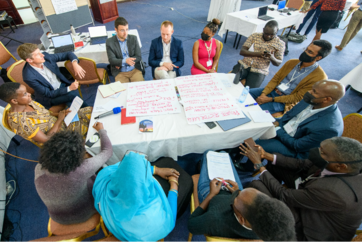
The German Federal Government sees the global carbon market as a key instrument in international climate change mitigation. Emissions trading allows for increased cost-effective investments in climate mitigation activities. Global carbon markets can support countries to achieve ambitious emission reduction targets and promote climate-friendly investments by the private sector. With the aim of promoting a global carbon market and supporting carbon pricing initiatives in countries around the world, the Federal Ministry for Economic Affairs and Climate Action (BMWK) has commissioned Deutsche Gesellschaft für Internationale Zusammenarbeit (GIZ) to conduct the Global Carbon Market project on its behalf.
The Global Carbon Market project assists public sector decision-makers around the world in implementing and using market-based instruments in their national climate action projects and plans – nationally determined contributions (NDCs), long-term strategies, climate change policies and legislation. With studies, capacity-building activities and pilot programmes, the project also supports the strategic development of new instruments for cooperative approaches under Article 6 of the Paris Agreement. It also promotes private sector involvement in the development and implementation of market-based solutions and advises both public authorities and private enterprise on the potential benefits of market-based instruments to mitigate climate change. Other project components include the provision of training to prepare government representatives in the partner countries for international climate change negotiations and providing support for regional cooperation in the carbon market. The project currently operates in Uganda (with regional support to partners in Eastern Africa) and Saint Lucia (with regional support to partners in the Caribbean). In previous phases of the project partner countries also included India, Tunisia and Chile.
In the project partner countries, many stakeholder groups in the public and private sectors have received capacity building support through trainings. These have focused primarily on utilising market mechanisms, carbon pricing, and climate finance instruments. As a result, awareness on the potential for market-based instruments to support climate change mitigation has been strengthened, and options for their use at the national level have been identified. Through trainings, studies and analyses, the Global Carbon Market project makes a valuable contribution in promoting market-based instruments at the national and international level. For example, the project team has provided support in integrating carbon markets into national climate change legislation, energy policies, and Nationally Determined Contributions (NDCs). The knowledge products published by the project help drive the debate on the future of the carbon market and highlight opportunities for the advancement of a high integrity market. The publications are available here. Below you can find more in-depth information on the country-specific activities of the Global Carbon Market project.
Country partners in the current project phase:
Carbon market participation by Eastern African countries has continued its upward trajectory in recent years. However, many countries aspire to increase their representation in the global carbon market and will require additional technical capacities and regulatory frameworks to make use of novel market mechanisms under Article 6.
Carbon markets represent a valuable opportunity for states in the Caribbean to tap into additional financing needed to fund needed to fund climate mitigation, sustainable development, and the renewable energy transition.
Countries: Uganda, St. Lucia, Grenada
Role of BMWK: Financed by BMWK
Lifecycle: 2023 - 2026
Implementation: Deutsche Gesellschaft für Internationale Zusammenarbeit (GIZ)
Other Organisations Involved: Uganda: Climate Change Department of the Uganda Ministry of Water and Environment; St. Lucia and Grenada: Caribbean Public Health Agency (CARPHA)
Contact: Sven Egbers, sven.egbers@giz.de
Cookie Settings
Marketing-Cookies werden von Drittanbietern oder Publishern verwendet, um personalisierte Werbung anzuzeigen. Sie tun dies, indem sie Besucher über Websites hinweg verfolgen.
Provider:
Statistik Cookies
Statistik-Cookies dienen der Analyse und helfen uns dabei zu verstehen, wie Besucher mit unserer Website interagieren, indem Informationen anonymisiert gesammelt werden. Auf Basis dieser Informationen können wir unsere Website für Sie weiter verbessern und optimieren.
Provider:
Erforderliche Cookies
Erforderliche Cookies sind für den reibungslosen Betrieb der Website zuständig, indem sie Kernfunktionalitäten ermöglichen, ohne die unsere Website nicht richtig funktioniert. Diese Cookies können nur über Ihre Browser-Einstellungen deaktiviert werden.
Provider: